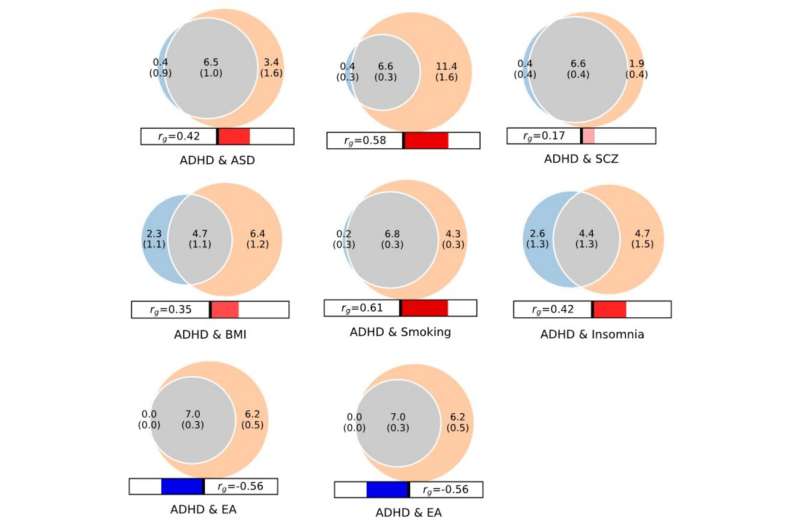This article has been reviewed according to Science X's editorial process and policies. Editors have highlighted the following attributes while ensuring the content's credibility:
fact-checked
peer-reviewed publication
trusted source
proofread
Researchers link 27 genetic variants to ADHD

Why do some people get ADHD, while others do not? And how early in life or in the womb is the seed of ADHD sown?
Researchers from Aarhus University have come closer to answering this question in a large study, which has just been published in Nature Genetics.
Together with national and international partners, the researchers have studied more than six million genetic variants in 38,691 people with ADHD and 186,843 people without ADHD. By this means it has been possible to identify 27 genetic risk variants for the common neurodevelopmental disorder.
Risk genes are expressed in the brain and neurons
The study is ground-breaking, inter alia because it finds more than twice as many risk variants as previous studies have identified.
The term "genetic variants" means specific variations in the DNA code—in this case, variants which are observed more frequently in people with ADHD than in people without the diagnosis. Variants in DNA affect, for example, the degree to which a gene is expressed and subsequently the amount of protein that is encoded by the gene.
By linking the genetic variants—i.e. the variations in DNA—to specific genes, the researchers have gained new knowledge about which tissues and cell types are particularly affected in individuals with ADHD. The study is based on data from the Danish iPSYCH cohort, deCODE Genetics in Iceland and the Psychiatric Genomics Consortium.
Subsequently, the researchers combined the results with existing data on gene expression in different tissues, cell types and brain development stages, and they discovered that genes involved in ADHD have a particularly high level of expression in a wide range of brain tissues and early in brain development—in fact already at the embryonic stage.
"This emphasizes that ADHD should be seen as a brain developmental disorder, and that this is most likely influenced by genes that have a major impact on the brain's early development," says Professor Ditte Demontis of the Department of Biomedicine at Aarhus University, who is first author of the study.
In addition, the researchers found that the genetics that increase the risk of ADHD particularly affect genes that are expressed in neurons, especially dopaminergic neurons.
"This is interesting because dopamine plays a role in relation to the reward response in the brain, and because a frequently used form of ADHD medicine works by increasing the concentration of dopamine in different brain regions. Our results indicate that the imbalance in dopamine in the brains of people with ADHD is partly attributable to genetic risk factors," says Ditte Demontis.
Associated with reduced concentration capacity and short-term memory
ADHD is influenced by many common genetic variants, each of which increases the risk slightly, says the professor.
In fact, with the help of advanced statistical models, the researchers have estimated that there are around 7,300 common genetic variants that increase the risk of ADHD. It is particularly interesting that the vast majority of these variants—84-98 percent—also have an influence on other mental disorders, e.g. autism, depression and schizophrenia.
It has previously been shown that risk variants for ADHD can affect a person's cognitive abilities.
To investigate this further, the researchers analyzed data from an independent dataset, consisting of 4,973 people who had undergone extensive neuro-cognitive tests. By using information from the new study about which variants increase the risk of ADHD, they found in the independent data set that an increased load of ADHD risk variants in the genome of an individual is associated with reduced reading and mathematical abilities, reduced attention and reduced short-term memory.
"The results increase our knowledge of the biological mechanisms underlying ADHD, and they point to specific genes, tissues and cell types involved in ADHD. This knowledge can be used as a starting point for further studies of the disease mechanisms and identification of new drug targets," explains Ditte Demontis.
And the study must be followed up, she emphasizes.
"We have only mapped a small fraction of the common variants that influence ADHD—just 27 of the 7,300 that potentially exist. So there is a need for larger genetic studies," she says.
International cross-disciplinary collaboration is the way forward
Large international collaborations are crucial to identifying the genetic causes of psychiatric diseases and neurodevelopmental disorders, because to do so requires studies of tens or hundreds of thousands of people with these conditions. Just as in the current ADHD study, there are often 100 or more researchers involved, with different areas of expertise, such as genetics, psychiatry, psychology, epidemiology, molecular biology, statistics, bioinformatics and computer science.
"In order to understand more of the genetic and biological mechanisms, it is important to have even larger studies, involving more people with ADHD," says Professor Anders Børglum of the Department of Biomedicine, Aarhus University, who is the last author of the study and one of the research directors of the Danish iPSYCH project.
"But it is also important to undertake studies that focus on identifying how the genetic risk variants perturb biological processes in the brain cells (the neurons), and their way of joining up and communicating with each other in the brain. For the latter, both brain cells and early developmental stages of the brain, so-called mini-brains or brain organoids, are currently being examined," he says.
More information: Ditte Demontis et al, Genome-wide analyses of ADHD identify 27 risk loci, refine the genetic architecture and implicate several cognitive domains, Nature Genetics (2023). DOI: 10.1038/s41588-022-01285-8




















